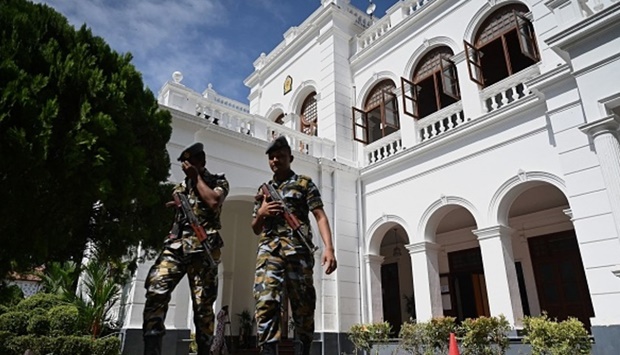Sri Lanka's besieged presidential office will reopen on Monday, police said, days after anti-government demonstrators were flushed out in a military crackdown that triggered international condemnation.
Widespread public anger over the island's unprecedented economic crisis saw protesters storm and occupy the colonial-era building earlier this month.
Soldiers were forced to rescue then-president Gotabaya Rajapaksa from his nearby residence on the same day, with the leader fleeing to Singapore and resigning days later.
Troops armed with batons and automatic weapons cleared the 92-year-old presidential secretariat in a pre-dawn raid Friday on the orders of Rajapaksa's successor, Ranil Wickremesinghe.
At least 48 people were wounded and nine arrested in the operation, during which security forces tore down tents set up by protesters outside the complex since April.
"The office is ready for reopening from Monday," said a police official Sunday, who declined to be named as he was not authorised to speak to the media.
"The siege of the secretariat, which lasted since May 9, has now been lifted."
Police said forensic experts had been called in to check damage to the Presidential Secretariat and gather evidence.
Western governments, the UN and human rights groups have condemned Wickremesinghe for using violence against unarmed protesters who had announced their intention to vacate the site later on Friday.
Wickremesinghe defended the crackdown and said he had told Colombo-based diplomats on Friday that blocking government buildings was unacceptable.
Police spokesman Nihal Talduwa said protesters were free to continue their demonstrations at a designated site near the presidential office.
"They can remain at the official protest site. The government may even open a few more places for demonstrators in the city," Talduwa said Sunday.
The military operation to clear the secretariat building and its immediate surroundings came less than 24 hours after Wickremesinghe was sworn in and just before a new cabinet was appointed.
- Burning fuel crisis -
Sri Lanka's 22 million people have also endured months of lengthy blackouts, record inflation and shortages of food, fuel and petrol.
Its government is officially bankrupt, having defaulted on its $51 billion foreign debt, and is currently in bailout talks with the International Monetary Fund.
The economic crisis which fuelled the protest campaign shows no sign of easing, but the government announced Sunday it would reopen schools which had remained shut for the better part of a month.
The education ministry said students and teachers will be asked to return to school only for three days each week as transport is still hampered by a national fuel shortage.
Miles-long queues of motorists waiting to fill up were seen across the country Sunday despite the government introducing a rationing system.
New president Wickremesinghe has said he will unveil a fresh budget for the rest of the year in August as previous revenue and expenditure estimates were unrealistic.

